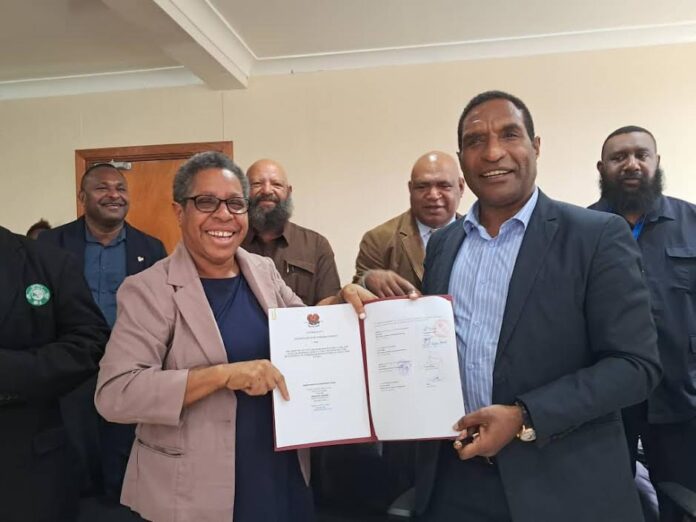
TWO major government departments have signed crucial Memorandums of Understandings (MoUs) on Friday as a step towards infrastructure and agriculture development.
The Minister for Works and Highways, Hon Solan Mirisim, and the Minister for Agriculture, Hon John Boito, were present to oversee the signing between the Department of Agriculture and Livestock (DAL) Secretary, Dr Sergie Bang, and the Rubber Industry Development Board’s Ms Joseph Keanni, alongside the Department of Works and Highways (DOWH) Secretary, Mr David Wereh.
The signed MOUs include; The Adoption of Cuplump Modified Bitumen and Cuplump Modified Asphalt Technology for the Development of Rubberized Road Systems in PNG.
Following the launch of the NASP 2024-2033, a team of engineers from DOWH, accompanied by Rubber Industry Development Board Chairlady Ms Joseph Keanni, visited Malaysia to study the adoption of Cuplump Modified Bitumen (CMB) and Cuplump Modified Asphalt (CMA) Technology.
This technology is said to revolutionize road systems in PNG by incorporating rubber for increased durability and sustainability.
Both the DOWH minister Mirisim and Secretary Wereh when welcoming the MoU spoke highly of the Connect PNG project emphasizing the need for agriculture to materialize through the Connect PNG program.
“It is crucial that rural areas where agricultural activities take place are connected by roads. Let’s say it’s the roads that grow the economy. So once the roads are there, agricultural activities grow,” said Minister Mirisim.
He also expressed gratitude to the Rubber Board for their cooperation in utilizing the rubberized road technology to improve the country’s road systems.
Minister Boito also welcomed the new rubberized road technology, praising its quality and potential benefits for agriculture and infrastructure.
Secretary Wereh emphasized that the Connect PNG initiative aims to empower rural small farmers by ensuring road connectivity. He noted that the DOWH is committed to using world-standard practices to maintain road accessibility despite PNG’s challenging climate and terrain.
Ms Keanni highlighted the long-term benefits of the rubberized road technology, stating that it offers a 10-year maintenance-free period, which could save significant costs for the DOWH and promote downstream processing for rubber.
She expressed her hopes for a better outcome for rubber farmers in the country through this MoU.
Under the agreement, a team of Works Engineers will be sent to Malaysia to further study the Rubberized Road System Technology. They will collaborate with the Rubber Board of Malaysia and the Malaysian Department of Works to establish a similar asphalt plant in PNG. This initiative aims to pave the way for the first model road in PNG within the next 18 months, with plans to commercialize the rubberized road system in line with the NASP 2024-2033 and Connect PNG Program.
